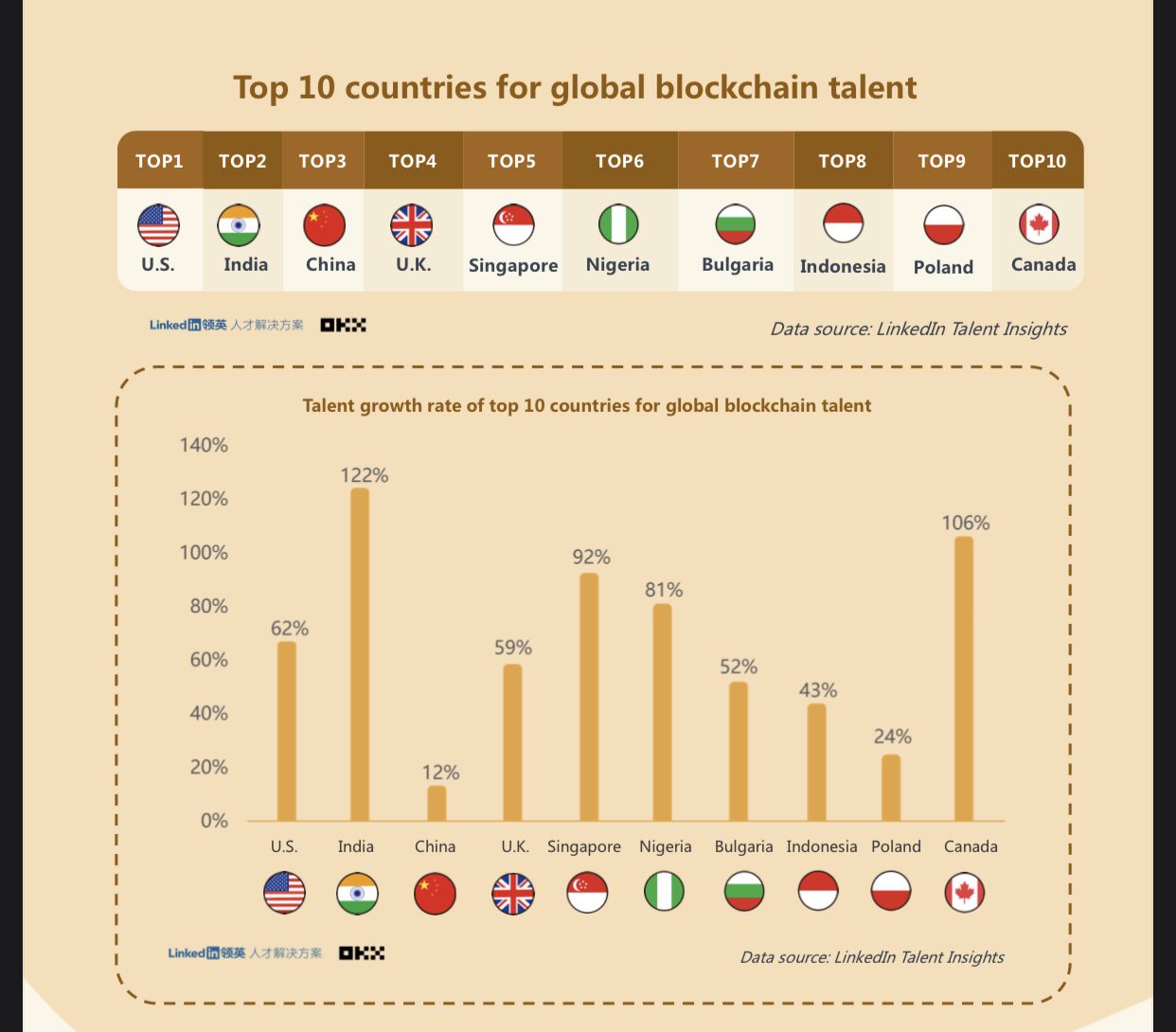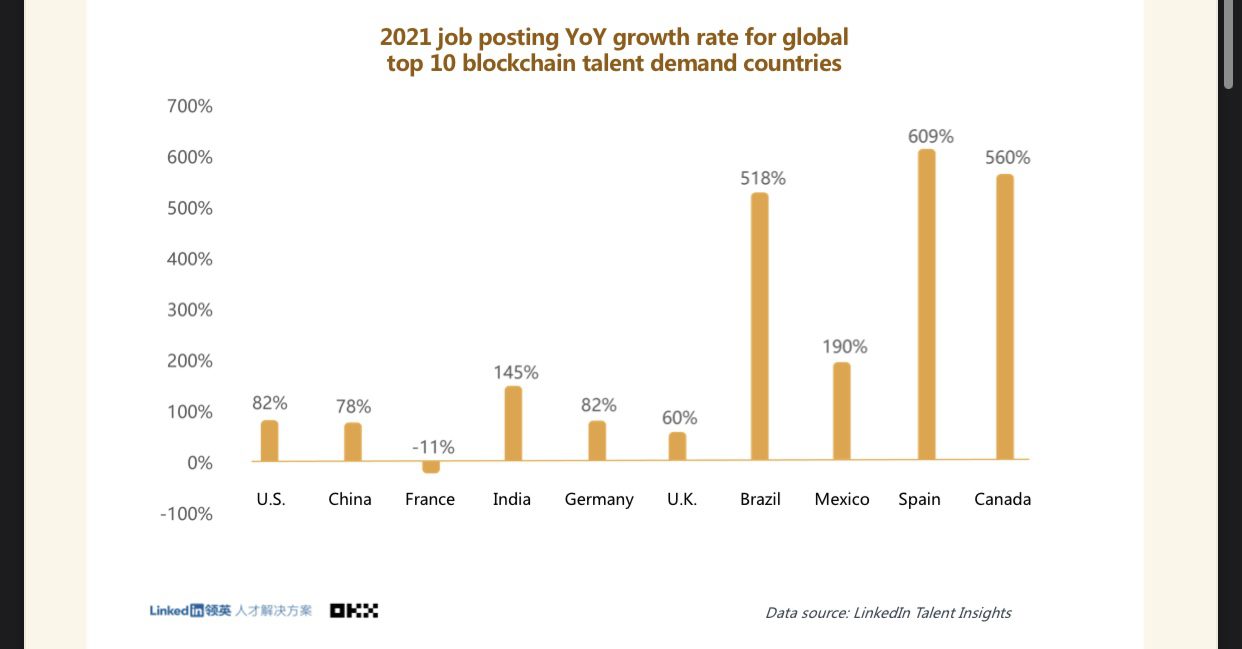The population of blockchain talent worldwide grew by 76% from 2021
Blockchain technology continues to be one of the liberating tools of the 21st century. A report has revealed that there has been a massive increase in the number of people who have gained employment with companies that build with the emerging technology.
According to a report conducted by professional networking platform LinkedIn and crypto exchange OKX, the number of people working in the blockchain industry has increased by 76% year-on-year as of June 2022.
Based on the data, the US, India and China are the top three nations in the world in terms of the number of citizens working in the blockchain industry. The UK, Singapore and Nigeria, the largest African crypto market, occupy the fourth, fifth and sixth positions respectively on the list.

According to the report, India is the nation with the fastest growing talent pool globally, with a growth rate of 122%. Next comes Canada with a growth rate of 106%, followed by Singapore at 92% and Nigeria at 81%.
Among the top 10 countries for demand for blockchain talent, Spain had the largest growth, 609%, in terms of the number of job postings related to blockchain technology. Canada has a growth rate of 560%, Brazil comes in third at 518% while Mexico is fourth at 190%.

The report indicates that the financial sector has the largest number of individuals working in the blockchain industry, accounting for 19% of the total. This is followed by engineering, which accounts for 16% of the total. Business development, information technology and sales occupy the third, fourth and fifth positions with 6% each.
The research concludes that financial talent makes up the highest proportion of talent, with the largest demand gap for technical talent such as engineering and IT talent. There is a significant gap in the need for technical skills:
“There is currently a huge gap in the demand for technical talent in the global blockchain talent pool. Until June 2022, in terms of job postings, engineering talent tops the global demand for blockchain talent, followed by IT talent. Product management, marketing and human resources are close behind. The finance category, which currently ranks first in terms of blockchain talent, is only sixth in terms of hiring demand.”
Also according to the report, in terms of talent growth, the five fastest growing global blockchain talent roles are Quality Assurance Analyst, Cryptologic Technician, Compliance Specialist, Artist and Support Analyst.
Quality Assurance Analysts also showed the highest growth rate from June 2021 to June 2022, at 713%, with Cryptologic Technician and Compliance Specialist in second and third place respectively, both growing over 250%.
The fastest growing roles reflect that, with the development of blockchain technology research and
its penetration, integration and development in various industries and fields, the blockchain industry is moving from being highly financial to being highly technical. It
Blockchain solves unemployment
One of the long-standing problems plaguing developing regions such as Africa is unemployment. According to data from credit rating agency Agusto & Co, Nigeria’s unemployment rate rose by 35% in 2021.
Things have not gotten better since then, rather they have gotten far worse, with rising inflation, economic decline and insecurity at alarming rates. The country’s young population has no choice but to run to the technology sector to learn skills that they can earn a living.
One of the burgeoning sectors that has given African and Nigerian youths employment is the blockchain sector. ‘Tech Bro’ and ‘Tech Sis’ are familiar phrases used to refer to young people with in-demand technical skills, who typically work remotely and earn dollars.
Apart from crypto trading, young people and in some cases teenagers are earning from working in blockchain companies as developers, community managers, content writers, brand ambassadors and other many lucrative positions.
Although the report indicates that professionals with at least a master’s degree account
for 40% of the talent in the global blockchain industry, the place in Nigeria has witnessed a steady and increased influx of students who remain idle as a result of an industry strike by university lecturers or graduates who are waiting for the next phase of life.
For example, Micah Bamigboye, a recent graduate of Obafemi Awolowo University told Technext that the Covid-19 lockdown was the defining point in his life. When the pandemic was at its peak, it was uncertain and everything seemed dark. The final year student at the Department of English had no choice but to learn how to trade cryptocurrency.
With consistency and perseverance, he understood the underlying principles of the technology, became proficient in crypto trading and has now grown to become a deep trader, brand ambassador for notable blockchain platforms and blockchain content writer for one of the leading African crypto media.
In his words:
“Covid-19 opened my eyes to the Nigerian reality. A view of what postgraduate days would be like without technical skills. I took advantage of the huge free time and within a few weeks I was earning more than my combined 6-month quota. I knew at that moment I wasn’t going back. All thanks to blockchain technology.”
Going forward, by the looks of things, blockchain technology will continue to save youth from the hands of unemployment. Given the growing interest in the blockchain and cryptocurrency space, there will be a continued increase in the number of people who will find work in this emerging technology sector.
Another report from Ripples, a blockchain company with products in commercial use by hundreds of customers in over 50 countries, in August indicates that 76% of financial institutions want to use blockchain technology for payments by 2025.


